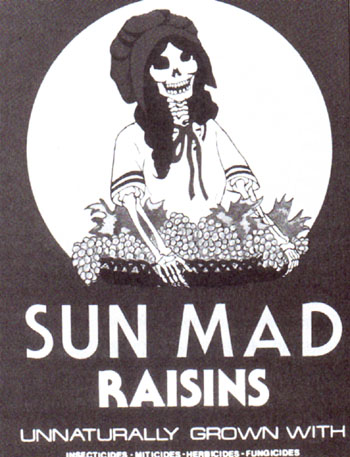
IT BEGAN IN DELANO
At the end of summer of 1965, the grapes were ripening in the fields around a farm town named Delano, California. Many of the farm workers in Delano had just come from the Coachella valley, the site of a recently successful strike. Farm workers demanded $1.25 per hour, and when they didn't receive it, on September 8 nine farms were struck, organized by AWOC's Larry Itliong.
After five days growers began to bring in Chicano scabs from the surrounding area. AWOC approached Césaer Chávez, the leader of the National Farm Workers Association, and asked the NFWA to join the mostly Filipino strike. At a meeting on September 16, packed with hundreds of workers, at Our Lady of Guadalupe Catholic Church in Delano, the NFWA voted unanimously, to shouts of "Viva la Huelga!" to strike too. Chavez was apprehensive. Asked later when he felt his organization, which had $100 in its bank account, would have been ready to go out on a big strike, he replied, "About 1968."
In joining the strike, the NFWA, with many more members than AWOC, took the lead. It also strengthened the ethnic make up of the strike: now the majority of workers involved were Chicano. By September 20 more than thirty farms were out, with several thousand workers leaving the fields. Despite the large numbers of striking farm workers, however, the workers could not muster picket lines at all the ranches simultaneously. There were many fields strung across hundreds of miles.
NFWA and AWOC set up a system of roving pickets, with different fields picketed each day. Fifteen or twenty cars full of pickets would go to a field where a grower was attempting to use strikebreakers. Striking workers, often harassed by the growers and police, sometimes violently, would try to get the scabs to leave the fields. Remarkably, their appeals were successful much of the time in persuading workers to join the strike.
The growers made a mistake almost immediately. They had always been able to end strikes with small wage concessions. Soon after the strike began, they raised wages to $1.25 per hour. This time they were shocked to discover it wasn't enough. The raise merely encouraged the strikers to believe they were being effective. Now there had to be a union, too.
The action in Delano was the first real stepping stone for the United Farm Workers. With the attention being given to Chicanos to the Chicano Movement, César Chávez and Dolores Huerta were able to bring national attention to the farm workers struggle. This action in Delano also helped prompt later strikes and begin a national grape boycott. Without a doubt, Delano is where the success of the United Farm Workers started.
Information provided by the United Farm Workers (UFW)
Home
Jaime's Home
Corrido